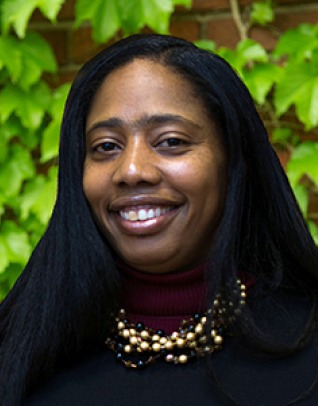Nidanie Henderson-Stull
Nidanie Henderson-Stull, PhD
Faculty - Full-Time
- Postdoctoral Scholarship, Molecular and Cell Biology, University of California, Berkeley, (2005-2008)
- PhD, Biological Sciences, Molecular Biophysics, The Rockefeller University (2005)
- BS, Biochemistry, Spelman College (1995)
- CHEM 115: Elements of Nutrition
- CHEM 340: Biochemistry
- CHEM 350: Project-Based Laboratory II (Biochemistry)
- LRNCLSTR 200: Being Human in STEM
- as an inaugural Faculty Fellow in the newly developed Center for Race, Ethnicity, and Human Rights (REHR), I will develop a new course at the intersection of STEM (Science, Technology, Engineering, and Mathematics) and the REHR center's themes.
- Proteins are more than just the bestowers of shiny, lustrous hair, hard nails, and strong muscles that TV commercials would have us believe. Every single cell in our bodies contains a diverse set of proteins, each with its own specialized function including structural integrity, transport, immunity, biocatalysis, homeostasis, cellular communication, and energetics. Since a protein’s specific function is correlated with its particular shape, studying the structures of these large, complex biomolecules helps us to learn about their function.
- Research efforts in my laboratory are directed towards determining the three dimensional structures and monitoring the reactions of a diverse class of proteins called multienzyme polypeptides, which can harbor as many as a dozen catalytic units in a single polypeptide chain. Student researchers in the lab learn a variety of techniques and skills from molecular biology, biochemistry, biophysics, and structural and computational biology. Students working on these projects also appreciate that our results have real-world implications in medicine and manufacturing.
- Drug design: The enzymes we study have been shown to cause cancer when mutated or expressed abnormally in cells. Understanding differences between the normal cellular structure of these enzymes and their mutant forms can aid in drug design and potentially patient well-being.
- Biocatalyst design: Although biocatalysts offer cost- and energy-effective alternatives to traditional chemical manufacturing processes, there are industrial processes where biocatalysts do not exist or present protein catalysts function poorly. The need to optimize existing or discover novel protein catalysts that function in industrial settings is paramount. Improved understanding of the multienzyme polypeptide’s unique engineering will impact innovation in the design of multifunctional biocatalysts.
- 2020 – present, Assistant Professor of Biochemistry, Soka University
- 2020 – 2022, Faculty Fellow, Center for Race, Ethnicity, and Human Rights, Soka University
- 2018 – 2020, Visiting Assistant Professor of Biology, Amherst College
- 2016 – 2018, STEM Advisor McNair Scholars Program, Augsburg College/University
- 2013 – 2019, Assistant Professor of Biology, Augsburg College/University
- 2011 – 2012, Visiting Assistant Professor of Biochemistry, McGill University
- 2008 – 2012, Assistant Professor of Biology, Carleton College
- 2006 – 2008, Lecturer of Chemistry, University of California Berkeley
- National Science Foundation RIG: Biochemical and Structural Studies of the Bcr Multienzyme Polypeptide (Continuation), 2013 – 2016 Award #: 1346950 Total costs: $141,763
- National Science Foundation Research Initiation Grant (RIG): Biochemical and Structural Studies of the Bcr Multienzyme Polypeptide, 2011 – 2013 Award #: 1120840 Total costs: $200,000
- National Institutes of Health Minority Predoctoral Fellowship, 1998 – 2002 Award #: 5F31GM19542
- Augsburg College Center for Teaching and Learning Scholarship Grant, 2018
- Hewlett Mellon Sabbatical Fellowship, Carleton College, Large Faculty Development Award, 2011
- HHMI/Carleton College Computational Curriculum Development Grant for Biochemistry lab, 2009 Carleton College Curriculum Development Fund, 2009
- Bush Foundation Fellowship Semi-finalist, 2016
- United Negro College Fund Merck Science Research Dissertation Fellowship, 2002 – 2004
- National Organization for the Professional Advancement of Black Chemists and Chemical Engineers’ Procter and Gamble Fellowship Award, 2002 – 2003
- Spelman College Academic Scholarship, 1991 – 1993
- Delta Sigma Theta Academic Scholarship, 1991 – 1992

